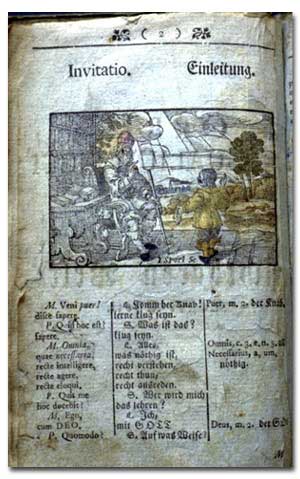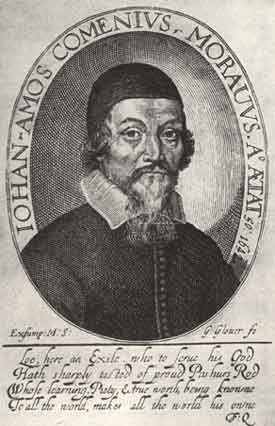Jan Ámos Komenský is known to the world by the Latin form of his name, Comenius. He was born in 1592 in Moravia. He was one of the chief representatives of the Czech Brethren, a philospher, theologian, and educational reformer. In 1628 he went into exile, never to return. He died in 1672 in Naarden, in the Netherlands, where he is buried. Among his writings are Labyrint světa a ráj srdce (The Labyrinth of the World and the Paradise of the Heart), Orbis pictus, Brána jazyků otevřená (The Gate of Languages Opened), Didactica Magna, and the unfinished General Treatise on the Remedy of Human Affairs (De Emendatione Rerum Humanarum Consultatio Catholica), from which I offer a few quotes:
- "To
teach is to lead from the known to the unknown."
- "If
we look into the causes of our problems, we find that they
come from the fact that people are able neither to govern
nor to be governed. They do not know how to govern others,
and they do not know how to govern themselves. They do not
know how to be governed by others; they do not know how
to be governed by themselves."
- "One
should speak when necessary, and be silent when necessary.
Truthful speech is simple. When action is needed and not
words, act and spare words. How many there are who only
speak, when it is necessary to act. He who has much to accomplish
and much to prove, should speak little."
- "The
essence of longevity is not to live in idleness, but rather
to be constantly and passionately at work. For the lazy
person it is always night and sleep, for the industrious
person, day and wakefulness. Sloth is like being buried
alive. The slothful person is as though dead. So have death
always before your eyes. Just as we all are born, so we
all must die. The only uncertainty is when. And on that
very point hangs eternity."
- "The
goal of human society is general peace and safety. And the
good of the people must be the greatest concern of any republic
or kingdom. Thus everything must be prevented which could
in any way disturb society, confuse or complicate or sever
social ties and personal safety. And the first among these
things is war."
- "We
must strive without let to restore to humankind freedom
of thought, freedom of conscience, and civic freedom. Freedom,
I insist, is the most splendid condition, created together
with man and indivisible from him. So lead man as much as
possible toward freedom."
And
finally Komensky's message from the time when the Czech state
was deprived of its independence and religious freedom: "And
I trust in God that when this storm of anger, brought down
on our heads for our own sins, has passed, government of your
affairs will return to you once again, O Czech people."

|

